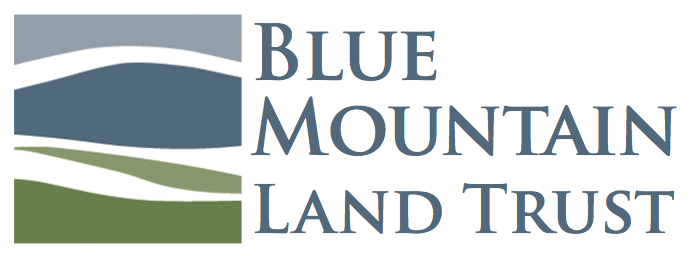Tony Buhr, Walla Walla Union Bulletin, April 30, 2018
The smell of fresh-cut wood permeated the air, and chips flew all about as two men wearing blue hard hats sawed through a tree blocking a trail in the Umatilla National Forest on Saturday.
With a snap of breaking wood, the tree’s last sinews gave way causing it to crash to the ground.
The weekend sawyers were two members of Blues Crew, a newly formed team of volunteers helping U.S. Forest Service employees clear trails in the Walla Walla Ranger District. The crew was established this month by members of the Blue Mountain Land Trust, and this was their second event.
Everyone is welcome and encouraged to participate, Blues Crew Leader Greg Brown said. Walla Walla’s trail systems are integral to the local economy, he said. If the Blue Mountain Land Trust can improve the quality of the local trails, people may come from other regions to enjoy hiking, ATV riding, motorcycling, hunting and fishing.
With the trail maintenance volunteer crew, Brown said the Land Trust hopes to keep trails open to prevent the community from losing them.
“The Forest Service has been chronically underfunded for many, many years,” Brown said. “They do not have the resources to maintain trails, and more and more trails are disappearing and becoming impassable.”
The crew spent five hours on Saturday clearing a 1 ½-mile section of the 9-mile North Fork Umatilla Trail. Volunteers cut through downed trees, cleared brush on the side of the trail, redirected streams and fixed the tread, or walking surface, of the trail. The team cut through about five logs, some of them over 2 feet in diameter.
It’s tricky work because the Forest Service doesn’t allow anything with a motor to be used in the wilderness area to preserve the natural environment, said Kiyoshi Fujishin, trail-crew supervisor with the Walla Walla Ranger District. This means people can’t use chain saws or weed trimmers.
Instead Fujishin carried a 6-foot crosscut saw over his shoulder while other crew members bore McLeods — a combined rake and hoe, and pulaskis — an ax and hoe combination, along with hand saws and pruners.
It is Fujishin’s job to clear trails for the ranger district. The Walla Walla Ranger District contains close to 200 miles of trail and employs two seasonal workers to help him. Every year he tries to at least remove all the downed trees from trails, but repairing erosion damage and cutting back the brush doesn’t always get completed, he said.
“These volunteer groups are turning out to be crucial just to get all this work done,” he said. “It is a losing battle, constantly.”
The Blues Crew is planning to pick two of its members to train with Fujishin to become trail supervisors, so they can engage in trail maintenance without direct supervision from a Forest Service employee, Brown said.
He said he hopes the work will help dispel myths that there are no trails for hiking in the northern Blue Mountains. A lot of people he talks to are hesitant to try hiking because of the trail conditions, he said.
“To me, trail maintenance is making people believe that they can get in,” Brown said.
The Blue Mountain Land Trust is also partnered with a host of other local and regional organizations, governments and agencies working to create a larger, regional, nonmotorized trail system that will increase hiking opportunities in the area. Blueprints for the Blue Mountain Region Trails project. are complete, but cities, counties, ports and other agencies are working to get grants to start the project.
No taxpayer money is being set aside for the project.

